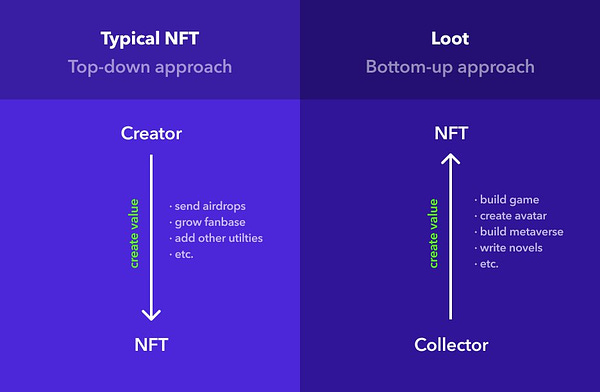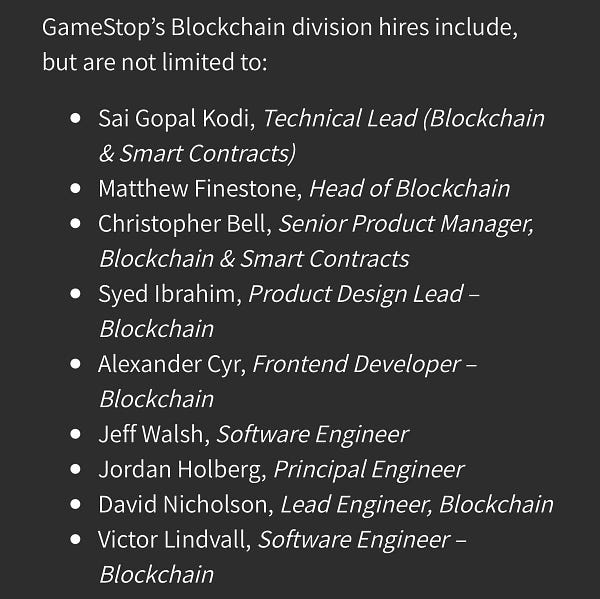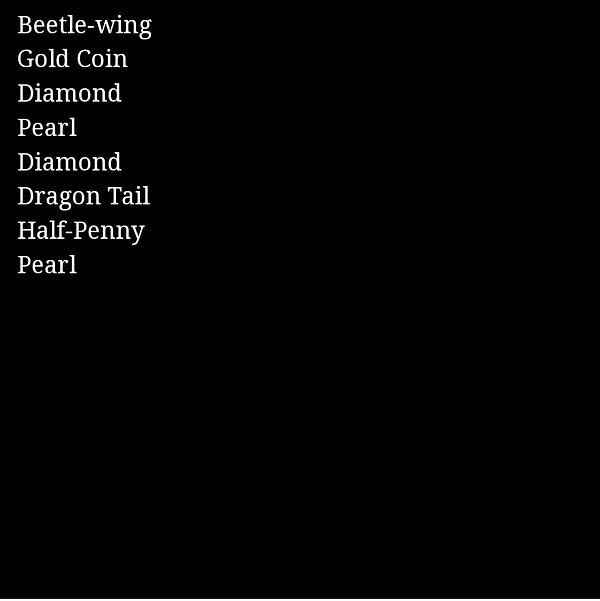A (mostly objective) piece on the power of creators and ecosystems. I also publish on TikTok, Youtube, and Twitter!
YouTube/podcast up soon (please subscribe for updates heh)
Fundamentals
What is meaning? Why do we do what we do? (gm everyone lol)
Meaning is created, not discovered.
Everything is within some sort of subjective realm (to a certain extent).
In the markets, things are meant to trade on fundamentals -
You have a certain valuation that comes from a certain set of expected cash flows and profitability and earnings etc, and all of that discounts back to a present value, which the asset is priced at (more or less)
There are layers to this covered by the efficient market hypothesis in which essentially
Prices reflect ~all~ information and stocks ~always~ trade at their fair value and the only way to outperform is through ~higher risk~.
Basically, the market is unbeatable. Nothing can generate alpha (risk-adjusted returns) and therefore, everyone should invest PASSIVELY. BECAUSE YOU WILL NEVER WIN (according to the efficient market hypothesis)
A couple of things here:
Disconnect from fundamentals: The market doesn’t really do this anymore. I am going to have a longer piece about that soon, but things are ~wacky~ with market dynamics.
Application to the beyond: Pricing structures are really hard to implement on other things beyond *assets*, like creators for example.
Prices end up being more about the narrative versus anything.
I’ve written a lot about crypto recently, explaining the fluffier parts of the meaning behind NFTs and crypto legislation, but I wanted to take this newsletter to really make one main point (that I think most people already know):
This is all a story.
Ecosystems
Stories exist within ecosystems.
Cambrian Explosion: 541 million years ago, the Cambrian Explosion happened, and lasted for (roughly) 13-25 million years. Most animals started animaling during this time. Life got more ~complex~ physically speaking, as organisms diversified.
Enron: On August 22nd, 2001, 20 years ago, Sherron Watkins sent a letter to Kenneth Lay with a 6-page letter of Enron’s accounting issues. Enron then shortly imploded.
Apple: On April 1st, 1976, Steve Jobs was in a garage. 44 years later, they have built a company that not only is in the pockets of most people, but also manages to scrape 30% from any app in their store (which is most).
What do all of these have in common?
All of them were PIVOTAL. And they are all ecosystems (there are so many more examples beyond these three, but hang with me here).
Cambrian Explosion was a literal, physical ecosystem that evolved to support life.
Enron was an ecosystem that got toxic - Not Past It dives deep into the groupthink and fear of being exiled from the tribe that ultimately caused Enron to shatter to pieces (among other things).
Apple is an ecosystem that tbh seems a little parasitic at times - but they have built out a world in which they own the eyes of most consumers. And people love them. Other brands that have built a positive-sum ecosystem would be Harley Davidson, Lululemon, Tesla, Trader Joes, Chacos, etc.
The Cambrian Explosion is the root physical ecosystem - it’s something that IS NOT driven by narrative because it’s a biological phenomenon.
But with markets (Enron and Apple) there is still that root physical - Enron’s people and Apple’s products and fans - that makes it an ecosystem. However, they are driven by narrative. Enron to the point of destruction and Apple to the point of prosperity.
Narrative is EXTREMELY valuable. If you can craft a narrative (and get others to believe it), you can do most things.
Choose Your Own Story
Loot is the perfect example of narrative becoming valuable. According to Bankless and Will:
The project was a randomized adventurer gear project consisting of 8,000 NFT loot bags. These game bags, which “intentionally omitted [images and stats] for others to interpret,” were free to mint directly from the project’s smart contract and cost only the price of gas to do so.
There were 8,000 NFT loot bags, consisting of words. People would build from their Loot. The secondary market got a little wild, with the rarest bag selling for $750k. I am sure it’s beyond that price even now - because it’s a way to design your own WORLD which is just unimaginably cool.
We get to choose the ecosystem.
(There is Synthetic Loot too).

It’s *THE* Game. The capital G Game. The one where the players figure out how it proceeds. A “culture lego”.
It’s flipping the NFT world on its head, where the collector builds the value from building the game, creating the avatar, building the metaverse, etc.


Also, the og GameStop is also hiring in this direction, flipping their business model. Everyone is trying to get on this storytelling train where they can hire, build, execute upon this GAME ecosystem.


Now, people can tell their own stories, craft their own ecosystem - and that’s really powerful. If you can decide the path of a project that you’re apart of (create the meaning, per se) you’re going to be that much more INVESTED in the outcome of the project.
You get to vibe alongside everyone else. And that’s pretty fun.

So everyone gets to tell a story. But what is the vessel for these stories to have reach? Who are the storytellers?
Creators
Outside of the Loot world, where YOU get to pick your own adventure, it gets a little fuzzy as to who is the “mouthpiece of the world”. It increasingly feels like it isn’t traditional media - there is some sort of disconnect. It just doesn’t feel very *human* at times.
Creators have a role here. They are the storytellers of the next generation. Creator communities have long been hacking away at traditional media coverage, because they are humans, and humans want to get their information in a humanistic way.
Humanism in media evolves through the following:
Things are weird
People are craving ‘normalcy’ with boils down into tangibility and accessibility.
This is one of the consequences of our increasingly decentralized society.
So we end up being more responsive (hypothetically) to a creator narrative versus a media narrative.
Because this is what creators do really well - be human. The creators are tearing down traditional media because they create inroads to accessibility.
Brands
The creator economy is a constant work in progress. They are storytellers yes, but they are also advertising funnels.
So there are two arms to it:
Media, as described above
A weird hybrid marketing thing
Brands are becoming increasingly aware that influencers/creators are the key to unlocking distribution. There are companies like Stir that are creating the tools for creators - but *who* are the creators actually creating for?
The line tends to blur between brand and audience - $you gotta get that bag$, but you also want to remain true to the people that subscribe to you - the reason that you are a “creator” in the first place.

Monetization
Monetization is something that no one has really been able to figure out.
There are startups like FYPM that seek to solve this problem, but it’s still tough.
(also, to make it clear none of this is bad. just objective analysis on the state of things)
The creator equation is as such:
Creator = Distribution + Marketing + Creativity + Brand Management + Trust
Brands get a LOT out of this:
Distribution = They get to tap into the creators audience (for a much, much lower price than it would have cost had they had to acquire this audience themselves).
The ROI here is easily higher than if the brand had to stake the audience on their own
Marketing = the brands have creators as partners.
This helps them convey their message to the audience described above - at a much lower CPM and in a much more *fun* way
Creativity = The creators are CREATIVE. That is what they do best.
Brands get a ~fresh, new perspective~ around their own product/service - which is immensely valuable to defining what the brand actually does.
Brand Management = creators do a lot of work for brands and the brand management process.
They can reinvent how people think about the brand (tying into the marketing idea) but also serves to put a gold stamp of approval next to the brand’s name.
Trust = People trust creators because of this human element.
The number one social currency is trust - and if brands can leverage that through creator partnerships, that is once again, a ~big ROI~
But along the way, things can get lost in the sauce. There isn’t a solid framework in place for this decentralized storytelling process quite yet in terms of process. Essentially, the ecosystem is fragmented. Groups like Smooth Ops are building towards it, but it’s weird.
Ownership is another fuzzy thing (especially with NFTs). Croissant highlights how some of this can be addressed but ownership is still really… uncertain.
also creators COPYRIGHT YOUR STUFF


I wrote a piece last week about “Owning the Online” but the question does become - who owns the content, the platform or you? Does the mode of the storytelling detract from the story itself? What does it mean to own content?
There are a lot of questions left to answer, and web3 seeks to solve a lot of them - but in the meantime -
It’s still about the story. Stripping it all away, we are seeking for the story, for the building of the ecosystem, for understanding our MAIN OBJECTIVE.
And the ecosystem in which these stories are being told is growing, flourishing, and we are nearing some sort of Cambrian Explosion of content.
We have the apps, the infrastructure, the tools - and we are still the singular-celled organisms trying to figure out how to use it all.
We can’t be the Apple or the Enron - because we haven’t even become animal phyla yet. It’s still really early.
The world has evolved before we did, and we are just now catching up to it.
Jobs Numbers
ADP Private Payrolls Huge Miss 374K, Exp. 638K
Just another note that this is *not* just crypto. Lots of things detach from fundamentals (if there are any) and trade in a way that seems not make any sense.

The Things Thinging
It’s all story at the end of the day.

You make a thing. Others build on the thing.
The thing things. But the thing only really things when people decide *how* they care how the thing is thinging.

Storytellers. Ecosystems. New markets. New tools.
It’s all intertwined, and we are very close to our own Cambrian Explosion.
Other things I’m thinking about:
China owning the data
Zero sum games
The infinite economy
This tweet from Dave that reminds me of this (h/t to drew) and now I must draw it

Disclaimer: This is not financial advice or recommendation for any investment. The Content is for informational purposes only, you should not construe any such information or other material as legal, tax, investment, financial, or other advice.








